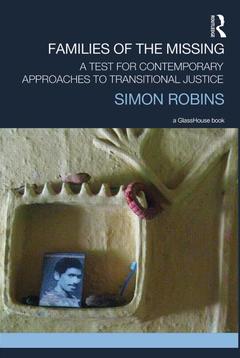Families of the Missing A Test for Contemporary Approaches to Transitional Justice Transitional Justice Series
Auteur : Robins Simon

Families of the Missing interrogates the current practice of transitional justice from the viewpoint of the families of those disappeared and missing as a result of conflict and political violence. Studying the needs of families of the missing in two contexts, Nepal and Timor-Leste, the practice of transitional justice is seen to be rooted in discourses that are alien to predominantly poor and rural victims of violence, and that are driven by elites with agendas that diverge from those of the victims. In contrast to the legalist orientation of the global transitional justice project, victims do not see judicial process as a priority. Rather, they urgently seek an answer concerning the fate of the missing, and to retrieve human remains. As important are livelihood issues where families are struggling to cope with the loss of breadwinners and seek support to ensure economic security. Although rights are the product of a discourse that claims to be global and universal, needs are necessarily local and particular, the product of culture and context. And it is from this perspective that this volume seeks both to understand the limitations of transitional justice processes in addressing the priorities of victims, and to provide the basis of an emancipatory victim-centred approach to transitional justice.
Chapter 1 Introduction; Chapter 2: Victim needs and transitional justice; Chapter 3: Nepal and Timor-Leste: The politics of transition; Chapter 4: Needs of families of the Missing in Nepal: Still seeking a process; Chapter 5: Timor-Leste’s transition and the Missing: A victim-centred evaluation; Chapter 6: Addressing the needs of families of the Missing: A critique of current practice in transition; Chapter 7:Beyond prescriptive approaches: contextualising a victim-centred transitional justice; Chapter 8: Towards victim-centred transitional justice; Chapter 9: Appendix: The Missing in Law
Simon Robins is a humanitarian practitioner and researcher with an interest in transitional justice, humanitarian protection and human rights. He has worked both in the field and HQ as a delegate of the International Committee of the Red Cross and with a range of other organisations. He is an Associate at the Post-war Reconstruction and Development Unit at the University of York.
Date de parution : 05-2013
15.6x23.4 cm
Date de parution : 01-2015
15.6x23.4 cm
Thèmes de Families of the Missing :
Mots-clés :
transitional; justice; process; truth; commissions; mechanisms; ambiguous; loss; santa; cruz; Transitional Justice; Transitional Justice Process; Young Man; Xefe Suku; Ambiguous Loss; Transitional Justice Mechanisms; Santa Cruz Massacre; Truth Commissions; Tharu People; CAVR Process; Restorative Justice; Nepal's Transition; Transitional Justice Practice; Victim Agency; Community Reconciliation Process; International Humanitarian Law; Disappeared Man; South African TRC; East Timor; Timor Leste; Bar Tel; Community Reconciliation Programme; Semi-structured Focus Group Discussions; Ad Hoc Human Rights Court; Lia Nain



